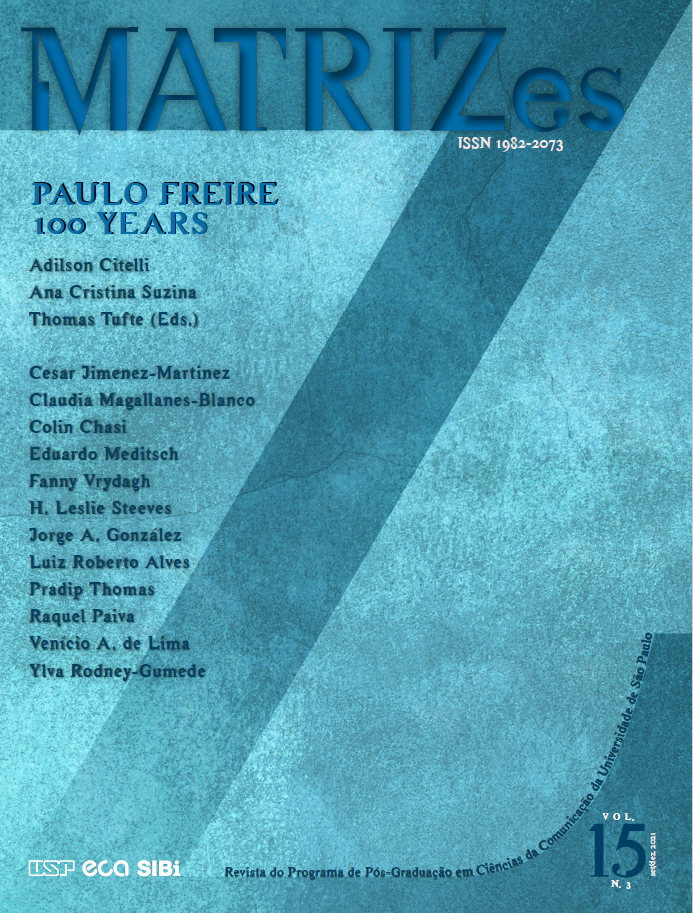Las Voces que Somos, an indigenous dialogic media utterance for liberation
DOI:
https://doi.org/10.11606/issn.1982-8160.v15i3p51-70Keywords:
Paulo Freire, Mikhail Bakhtin, Dialogue, Media utterances, Indigenous communicationAbstract
In this article I review Paulo Freire’s theories of anti-dialogic action and of dialogic cultural action, as well as Bakhtin’s notion of dialogue and utterances. Drawing from these, I focus on a communication project of Indigenous media and communication practitioners from the state of Oaxaca, Mexico, and on one of its media products which I consider a media utterance. I argue that the core themes of the communication project and a radio series that addresses them reflect the dialogue between Indigenous communication practitioners and the ongoing reality they face that menaces their territories and ways of life. Dialogue is a key component of a communicative process that shapes our understanding of the world-system and makes differences and inequalities evident.
Downloads
References
Bakhtin, M. (1986). Speech genres and other late essays (C. Emerson & M. Holquist, Eds.; V. McGee, Trad.). University of Texas Press.
Castellanos Guerrero, A., Gómez Izquierdo, J., & Pineda, F. (2007). El discurso racista en México. In T. A. van Dijk (Coord.), Racismo y discurso en América Latina (pp. 285-332). Gedisa.
Castells i Talens, A. (2011). ¿Ni indígena ni comunitaria? La radio indigenista en tiempos neoindigenistas. Comunicación y Sociedad, (15), 123-142.
Durán Matute, I., & Moreno, R. (2021). La lucha por la vida frente a los megaproyectos en México. Cátedra Jorge Alonso. https://bit.ly/3mpRLyR
EDUCA, A.C. (2021). El Topil. Boletín de análisis y reflexión política, (42). https://bit.ly/3zyIZl8
Freire, P. (2008). Pedagogía del oprimido. Siglo XXI.
Galtung, J. (1996). Peace by peaceful means. Sage.
Gómez Izquierdo, J., & Sánchez, M. E. (2012). La ideología mestizante, el guadalupanismo y sus repercusiones sociales. Una revisión crítica de la identidad nacional. Benemérita Universidad Autónoma de Puebla; Universidad Iberoamericana, Puebla.
Harvey, D. (2005). El “nuevo” imperialismo: Acumulación por desposesión. Socialist Register 2004 (pp. 99-129). CLACSO.
Hirschkop, K., & Sheperd, D. (Eds.). (1989). Bakhtin and cultural theory. Manchester University Press.
Holquist, M. (Ed.). (1981). The dialogic imagination. Four Essays by M. M. Bakhtin (C. Emerson & M. Holquist, Trads.). University of Texas Press.
Instituto Nacional de Estadística Geografía e Informática. (2020). Presentación de Resultados. Censo de Población y Vivienda 2020.
Korsbaek, L., & Sámano-Rentería, M. A. (2007). El indigenismo en México. Antecedentes y actualidad. Ra Ximhai, 3(1), 195-224.
Magallanes-Blanco, C. (2016). Hablando de nuestra Madre: Videos indígenas sobre la naturaleza y el medio ambiente. In C. Magallanes-Blanco & J. M. Ramos Rodríguez (Eds.), Miradas propias. Pueblos indígenas, comunicación y medios en la sociedad global (pp. 133-152). UIA Puebla; Ciespal.
Magallanes-Blanco, C., & Di Lauro Bentivogli, G. (2021). Evaluación de un proyecto de comunicación, género, territorio y paz en Oaxaca, México [Manuscrito não publicado].
Magallanes-Blanco, C., & Monteforte, G. (2019). Un engagement commun: Des médias autochtones et communautaires pour changer la réalité. In S. Gergaud & T. M. Herrmann (Eds.), Cinémas autochtones: Des representations en mouvements (pp. 53-71). L’Harmattan.
Maldonado-Torres, N. (2007). On the coloniality of being. Cultural Studies, 21(2-3), 240-270. https://doi.org/10.1080/09502380601162548
Martinez Luna, J. (2013). Textos sobre el camino andado (Tomo I). CMPIO; CAMPO; CEEESCI; CSEIIO.
Mignolo, W. D. (2007). Introduction: Coloniality of power and de-colonial thinking. Cultural Studies, 21(2-3), 155-167. https://doi.org/10.1080/09502380601162498
Nakata, M. (2014). Disciplining the savages. Savaging the disciplines. Aboriginal Studies Press.
Ojo de Agua Comunicación. (2020). Propuesta técnica de ayudas a proyectos [Manuscrito não publicado].
Ojo de Agua Comunicación. (s.d.). Las voces que somos. https://bit.ly/3jlrKiG
Quijano, A. (1998). Colonialidad del poder, cultura y conocimiento en América Latina. Ecuador Debate, (44), 227-238.
Salazar, J. F. (2009). Self-determination in practice: The critical making of indigenous media. Development in Practice, 19(4), 504-513. https://doi.org/10.1080/09614520902866397
Schiwy, F. (2009). Indianizing film. Decolonization, the Andes, and the question of technology. Rutgers University Press.
Smith, L. T. (2012). Decolonizing methodologies. Research and indigenous peoples. Zed Books; Otago University Press.
Sousa Santos, B. (2018). Construyendo las epistemologías del Sur: Para un pensamiento alternativo de alternativas. CLACSO.
Tischler, S. (2013). Revolución y destotalización. Grietas.
Todorov, T. (1984). Mikhail Bakhtin. The dialogical principle (Wlad Godzich, Trad.) (Theory and History of Literature, Vol. 13). University of Minnesota Press.
Walsh, C. (Ed.). (2013). Pedagogías decoloniales. Prácticas Insurgentes de resistir, (re)existir y (re)vivir (Tomo I). Abya Yala.
Zurita Cruz, M. (s.d.). La experiencia de formación en género para comunicadoras de nueve comunidades indígenas de Oaxaca [Manuscrito não publicado].
Downloads
Published
Issue
Section
License

This work is licensed under a Creative Commons Attribution-NonCommercial-ShareAlike 4.0 International License.
Authors who publish in this journal agree to the following terms:
- Authors retain the copyright and grant the journal the right to first publication, with the work simultaneously licensed under the Creative Commons Attribution License (CC BY-NC-SA 4.0) which allows sharing of the work with acknowledgment of authorship and initial publication in this journal for non-commercial purposes.
- Authors are authorized to assume additional contracts separately, for non-exclusive distribution of the version of the work published in this journal (eg, publishing in institutional repository or as a book chapter), with acknowledgment of authorship and initial publication in this journal.






















